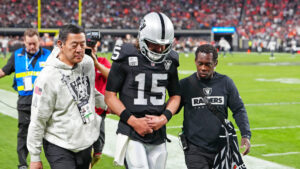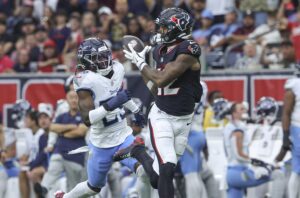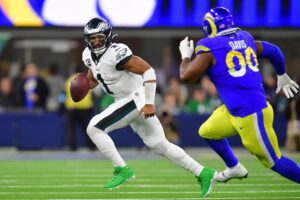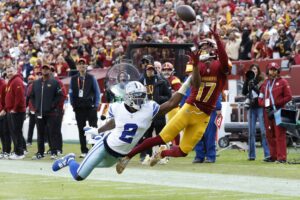A sharp and poignant opening drive was reflective of the fundamental work that the Kansas City Chiefs have been putting in at training camp. Alex Smith connected with wide receiver Tyreek Hill for a quick 32-yard gain on the opening play. Running back Spencer Ware finished the shock and awe opening with a quick touchdown. Eight plays, three-minutes, and 75 yards later, the drive was a kick to the San Francisco 49ers gut. Alas, this is only pre-season week one, and that would be it for the number one offense. They showed their offseason work had been effective and could work in game. But after that, it was time for backup players to compete and make their argument they ought to wear the Kansas City Chiefs uniform. The overall tone was a mix of positive reaction and the revealing of some deep-rooted problems. Between the mix of players and schemes, the 27-17 Kansas City Chiefs preseason loss revealed five big takeaways on the good, bad, and ugly.
Kansas City Chiefs Preseason Loss to San Francisco 49ers – Five Takeaways
Number one – Alex Smith to Tyreek Hill is a Legitimate Threat
The opening thirty-two-yard reception was Hill’s only catch of the game. However, it represented what will be the primary connection for the Chiefs passing game. Smith has been working on establishing explosive passes in camp, and seeing it played out in a game was pleasant.
A common complaint regarding Andy Reid’s play calling in the past is becoming beholden to short passing, and negating the opportunity to go deep. Whether that be due to the nature of the west-coast scheme, or an intrinsic problem with Smith’s abilities, the problem has no excuse to persist.
After the opening play, the young San Francisco 49ers defense observably pulled back in their defense and emphasized locking down Hill. This allowed for short passing plays to turn into medium gains, and a scramble play where Smith ran for ten yards and a first down.
Yes, this is pre-season week one, but the Smith to Hill connection is a real threat that can unlock opportunities in the offense.
Number Two – Spencer Ware Has Fresh Life
Despite concerns that Spencer Ware’s abilities were overblown and better fit for a running back by committee system, he has been the number one running back in training camp. While Ware did score a touchdown, he ran only four times for six yards. However, the most impressive sample size was four passing targets from Smith and Tyler Bray.
In 2016 the perception of Ware was a running back who was overperforming due to his tenure as a career backup to Jamaal Charles. Even after 921 yards rushing and 447 yards receiving, the perception remained idle: Ware is a backup. Last night it was not the rushing touchdown that showed this perception is not true, but the multiple targets in the passing game.
Ware caught three passes for 20 yards, while being targeted four times. He served as a check-down target for Smith and Bray, effectively running underneath routes. The best part of his impact was the urgency he ran routes with. Comparing last year’s games to the first pre-season game, Ware ran with the intentionality of a crisp receiving back.
His overall play was a small sample-size, but the urgency and route crispiness show promise for Ware having fresh legs to dominate the running back room. He will be used more in the 2017 offense or die trying.
Of note, Ware impressively popped linebacker Jayson Dimanche on the touchdown run.
Number Three – The Offensive Line is a Revolving Door
Despite a successful start, the offensive line quickly became the biggest concern of the night. Although Bray was only sacked once, he was under constant pressure, including a play that lead to an interception by 49ers corner Rashard Robinson. Bray had his own problems setting his feet, but he was never allowed to get into a rhythm and spent more time looking for incoming rushers.
Take that a step further, and the second-string offensive line failed to let the running game bust free. Ware garnished only six yards, and Charcandrick West later only garnished six yards on five attempts. To be blunt, the offensive line was dominated.
There was no one lineman that faltered, but tackle Isaiah Battle was particularly bad. He was called for offensive holding and then a false start on consecutive plays. However, the interior joined in their foray of mistakes. The running game stood no chance to get moving, and Solomon Thomas wrecked while Bray was in.
Later in the game, Patrick Mahomes struggled behind a revolving door. Fortunately, he is an athletic quarterback and survived behind the line. Being said, he spent more time improving his scrambling ability than getting set in the pocket, deconstructive to fixing habits from Texas Tech.
The starting unit has looked mediocre in camp, but will hopefully become cohesive come the opener against the New England Patriots. However, if there are any injuries, Smith will be running for his life and Ware will be going nowhere fast.
Confused, out of sorts, and slow. Yes, the line was that concerning.
Number Four – Special Teams is Truly Special
The importance of the Kansas City special teams and coach Dave Toub has been iterated in the past. Fortunately, that iteration will continue in 2017 even as a new returner takes over Hill’s role. Not only the speed flashed, but the aggressive and opportunistic play.
Toub has developed a crew of heat seeking missiles out of young players. Even rookie running back Kareem Hunt joined in the fun. Kevin Pierre-Louis put an aggressive bull rush on the front line and blocked a punt mid-way through the third quarter. The ball bounced around, but it was the tenacious Hunt who recovered the punt.
The special teams dominated the entire game, not only during this one instance. They were noticeably faster and stronger, holding to their conviction of insistent competition. Pierre-Louis looks to be an outstanding trade acquisition. The competition for the rest of the crew will be tough, but here are some names to watch separate themselves: Leon McQuay, Jehu Chesson, C.J. Spiller, and De’Vante Basuby.
Number Five – Sacks and Redzone defense
The most impressive moment of the night came when the Chiefs defense had to make an eight-play goal line stand. Due to penalties, the Chiefs kept trying to give the 49ers and Matt Barkley opportunity to score. However, the Chiefs defense rose time and time again to stuff the run and put pressure on Barkley.
In 2016, the Chiefs were fifth in the NFL by allowing opponents to score a mere 49.1% of the time in the red zone. That model looks sustainable in 2017.
Later in the game, the sacks started to mount as linebacker Marcus Rush, defensive lineman David King, and Earl Okine all mounted pressure throughout the game. Each play came at opportunistic plays, again reflecting the Chiefs ability to negate opposing team momentum.
However, not all was bright for the defense. The backup rush defense let 49er running backs Joe Williams and Matt Breida, and Raheem Mostert appear as all-stars. The 49ers combined for 36 carries and 188 yards rushing.
After the opening defense took a seat, the interior rush defense moved one way: backward. They could not get a push, and let the 49ers offensive line run into linebackers. While this is the backup defensive line, again the importance of Bennie Logan and Allen Bailey to clog the middle is made evident.
Bob Sutton’s 3-4 defensive scheme relies on a strong push in the middle to force running backs to run into corner linebackers and edge defenders. Without that push in the middle, the Chiefs linebackers were caught in a dichotomy of indecision.
Honorable Mention
Chiefs kingdom loves rookie quarterback Patrick Mahomes, so just in case you missed his first touchdown pass to Marcus Kemp, here you go. Very Brett Favre-esque. Additionally, here is every play from Mahomes’ start.
The Kansas City Chiefs return to practice on Sunday, August 13th. Next Saturday August 19th, the Chiefs march into Paul Brown Stadium to take on the Cincinnati Bengals at 6PM Central time.
Embed from Getty Images






